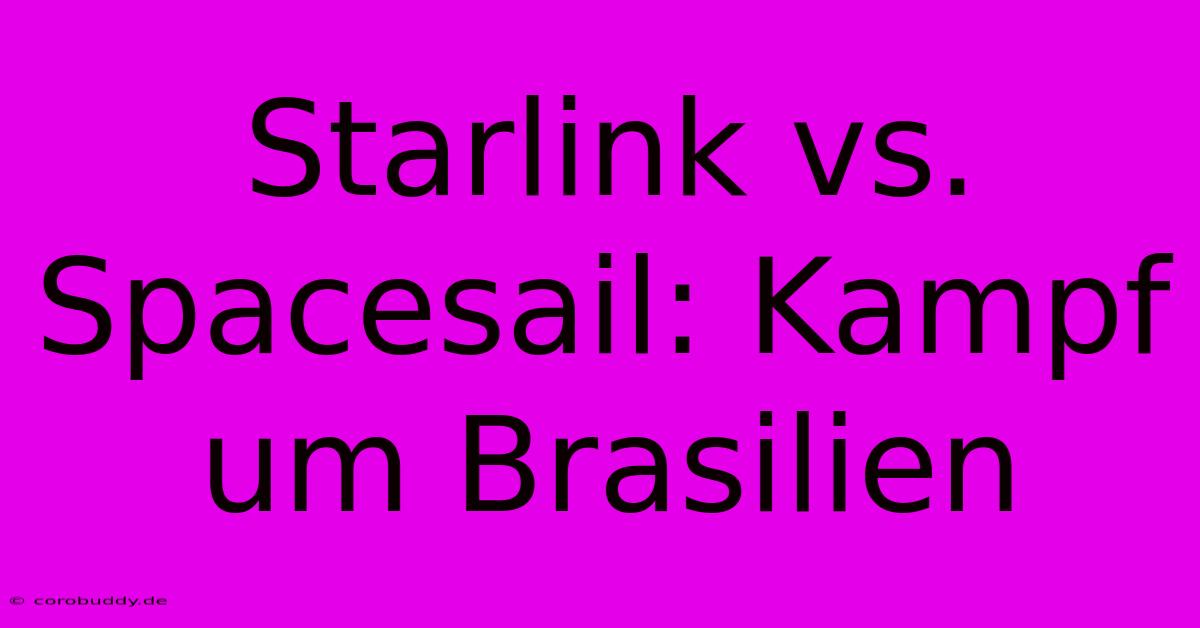Starlink Vs. Spacesail: Kampf Um Brasilien

Discover more detailed and exciting information on our website. Click the link below to start your adventure: Visit Best Website Starlink Vs. Spacesail: Kampf Um Brasilien. Don't miss out!
Table of Contents
Starlink vs. Spacesail: Kampf um Brasilien – Der Wettlauf um das brasilianische Internet
Hey Leute! Let's talk about something huge – the battle for internet domination in Brazil! It's a real David vs. Goliath story, or maybe more like two Goliaths slugging it out. We've got Elon Musk's Starlink, the flashy newcomer with its thousands of satellites, going head-to-head with Spacesail, a Brazilian company trying to carve out its own piece of the pie. It’s a fascinating clash of tech titans, and I'm here to break it down for you.
The Starlink Assault: High-Speed, High-Altitude Internet
Starlink, everyone's heard of it, right? The promise of super-fast, low-latency internet, even in the most remote corners of the planet. Sounds amazing, and for many parts of Brazil, especially the vast Amazonian region, it is amazing. I remember reading about a small village in the Amazon that finally got connected thanks to Starlink – it was life-changing for them. Access to education, healthcare, and the wider world – it’s huge.
But there's a catch. Starlink's hardware isn't cheap. The dish, installation, and monthly subscription fees can add up quickly. It's a premium service, definitely not for everyone. Plus, there's the whole issue of regulatory hurdles. Getting the necessary permits and approvals in Brazil, a country with its own complex bureaucracy, hasn't been a walk in the park for Starlink. They're facing some serious challenges.
Spacesail: The Homegrown Hero
Then we have Spacesail. This is where things get really interesting. Spacesail is a Brazilian company, and they're aiming to provide internet access using a different technology. I'm not going to lie – the specifics of their tech are a bit beyond me. It involves a network of ground stations and some seriously clever networking, but the goal is the same: bring reliable internet to underserved areas.
What I do understand is that Spacesail has a potential advantage: They’re deeply rooted in Brazil. They understand the local challenges, the infrastructure limitations, and the regulatory landscape. They can work with the existing systems, maybe even integrate with existing networks. It's a much more ground-up approach than Starlink's satellite blitz.
The Battleground: Rural Brazil
The main arena for this fight? Rural Brazil. Millions of Brazilians live in areas with limited or no internet access. This digital divide is a major obstacle to economic development and social progress. Both Starlink and Spacesail see this as a huge opportunity.
Honestly, I think it's great to have this competition. A bit of healthy rivalry can only push both companies to innovate and provide better services. Lower prices, improved technology, wider coverage – that’s what we, the consumers, benefit from.
The Future of Brazilian Internet: A Two-Horse Race?
So, who will win this "Kampf um Brasilien"? It's too early to say definitively. Starlink has the global brand recognition and the massive satellite constellation, but Spacesail possesses a deep understanding of the local market and a potentially more cost-effective solution. I suspect we'll see a scenario where both players coexist, each finding its niche.
Maybe Starlink will dominate in the most remote areas, while Spacesail focuses on connecting smaller towns and villages. It's a fascinating development, and I'll be following it closely. This is more than just a fight for market share; it's a battle to connect Brazil, to bridge the digital divide, and that's something worth rooting for. What do you think? Let me know in the comments!

Thank you for visiting our website wich cover about Starlink Vs. Spacesail: Kampf Um Brasilien. We hope the information provided has been useful to you. Feel free to contact us if you have any questions or need further assistance. See you next time and dont miss to bookmark.
Featured Posts
-
Grand Prix Hase Volodin Fuers Finale Qualifiziert
Nov 24, 2024
-
Video Mbappe And Real Madrid
Nov 24, 2024
-
Bundesliga Leipzig Hoffenheim Trotz Handicap
Nov 24, 2024
-
Flint Treasure Of Oblivion Gameplay
Nov 24, 2024
-
Vierlinge Auf Hof Kreienbarg Die Namen
Nov 24, 2024
